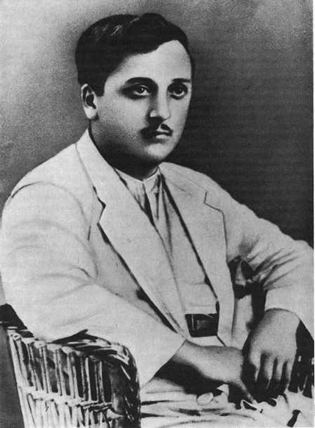The views expressed in our content reflect individual perspectives and do not represent the authoritative views of the Baha'i Faith.
Imagine this: one day you’re a college student in your mid-20s, studying abroad; and the next day you’re named to lead a rapidly-growing global religious movement. How would you handle it?
Following the death of Abdu’l-Baha in 1921, Baha’is around the world anxiously awaited information about who would succeed him as global head of the Baha’i Faith.
After the reading of Abdu’l-Baha’s Will and Testament on January 3, 1922, news spread rapidly that he had chosen his 24-year-old grandson Shoghi Effendi as the person to whom all the Baha’is should turn, giving him the title the Guardian of the Cause of God. The enormous challenges and responsibilities of the moment weighed heavily on his young shoulders.
The Baha’is’ beloved teacher and exemplar was dead. In their grief, many people, both Baha’i and otherwise, held outsized expectations for his chosen successor. Over the passage of years people gradually came to recognize the power of divine assistance at work in the life and labors of Shoghi Effendi. But one of the first lessons he had to teach was that he was his own person with his own role, distinct from that of his beloved grandfather. Nearly a half century later, his wife Ruhiyyih Khanum wrote in her biography of him, The Priceless Pearl, of some of the difficulties he faced:
Aside from his extreme youth, the beardless Oxford student, however dignified in his manner, refused to even pretend he was like the bearded patriarch everyone knew so well as one of the features of Haifa—much loved or much hated as the case may be—but always respected as it most outstanding notable. Shoghi Effendi refused to wear a turban and the long oriental robes the Master had always worn; he refused to go to the mosque on Friday, a usual practice of Abdu’l-Baha; he refused to spend hours with visiting Muslim priests, who were wont to pass the time of day with the Master, and who no doubt now were eager to assess the stripling He had placed in His seat as Head of the Faith. The Guardian, when members of Abdu’l-Baha’s family remonstrated with him for not following in the ways of the Master, would reply he must devote himself undividedly to the work of the Cause. All this must have added to his suffering and caused much alarm within the family and local community. – pp. 54-55.
When Shoghi Effendi learned of Abdu’l-Baha’s death, he was immersed in his studies at Oxford University in the United Kingdom. For those who hoped everything would continue just as it had before, Shoghi Effendi represented a major departure. He wasn’t on familiar terms with Abdu’l-Baha’s extensive network of contacts in the local area. He was western-educated and acclimated to living abroad. He didn’t write prayers or give public talks on diverse themes. He didn’t lavish personal attention on individuals or travel to distant lands to visit Baha’i communities. His leadership style was clearly different from Abdu’l-Baha’s. In this way, he upheld what the Baha’i teachings have to say about truthfulness.
Another new principle revealed by Baha’u’llah is the injunction to investigate truth—that is to say, no man should blindly follow his ancestors and forefathers. Nay, each must see with his own eyes, hear with his own ears and investigate the truth himself in order that he may follow the truth instead of blind acquiescence and imitation of ancestral beliefs. – Abdu’l-Baha, The Promulgation of Universal Peace, p. 454.

Shoghi Effendi knew that if he just imitated his grandfather he wouldn’t do justice to his new responsibilities. The spiritual power of Abdu’l-Baha, the Guardian understood, did not come from the clothes he wore, the way he kept his facial hair, or the way he entertained guests—it arose out of his complete commitment to the needs of the Baha’i cause.
Shoghi Effendi used his judgment to decide how he himself, not an idealized replica of Abdu’l-Baha, could rise to the occasion. He focused his efforts on assisting Baha’is to become more organized and systematic in their attempts to establish the Baha’i teachings in the world. He actively directed and guided the Baha’i community in establishing and developing its worldwide, democratically-elected administrative structure of local and national Spiritual Assemblies. He kept up correspondence and met with visiting Baha’is on pilgrimage to the sacred shrines of Baha’u’llah and the Bab. He didn’t have the bursting radiance of Abdu’l-Baha, but he managed his huge responsibility with a profound spirituality and love that deeply attracted the hearts of those he met.
In Shoghi Effendi, we see an example of someone grappling with two challenges that might often compete with each other: one, to give himself wholeheartedly to something far greater than himself, and two, to remain true to who he was. As his service to the Baha’i cause gathered momentum and reached its stride in the following decades, and as the global Baha’i community flourished and grew, memories of him bear witness to the grace with which he reconciled these two impulses.

















Comments
Sign in or create an account
Continue with Facebookor